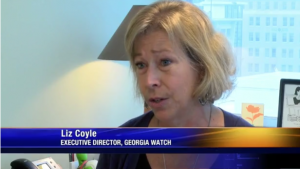By Anne Maxwell – WJBF
WAYNESBORO, Ga. (WJBF)- The construction of two nuclear reactors at Plant Vogtle is years behind schedule and billions over budget. Last month, the contractor, Westinghouse Electric, filed for Chapter 11 bankruptcy protection.
Plant Vogtle employees hundreds of people in Burke County and the temporary contract with Westinghouse expires Friday, which means the project’s future after that is up in the air.
An attorney for Georgia Power, which is one of the main owners of Plant Vogtle, has said all options are on the table. They could totally shut down the project, or build only one of the two reactors they are currently constructing. There has also been talk of converting it to a natural gas plant, but it is not clear whether that would be economical. Or they could continue building despite even higher costs.
But no matter what happens, Georgia Power is still going to make a profit.
Plant Vogtle reactors three and four were supposed to be powering our homes and businesses by now, but they are about three years behind schedule and billions over budget.
And on top of that, Westinghouse Electric, the company contracted to implement the cutting-edge technology of the reactors, just filed for Chapter 11 bankruptcy.
That means the project’s cost is going to go up even more.
This ambitious construction project has been plagued by cost overruns and delays. But you may be surprised to learn that Georgia Power, one of the plant’s primary owners, is still making a profit off its construction, even though no energy has been generated from it, and its future is up in the air after Westinghouse’s bankruptcy.
“On May 12, we’ll find out if Westinghouse is going to honor their contract or if they’re going to abandon the contract,” said Tim Echols, one of five members on Georgia’s Public Service Commission, which oversees and regulates utilities.
Westinghouse’s financial woes are largely considered to be tied to their involvement in Plant Vogtle and the V.C. Summer Plant in South Carolina.
Its parent company, Toshiba, stated its nuclear power business has already lost $6 billion.
“We have Toshiba co-signing on this project,” Echols said. “But if they go bankrupt, they escape from the obligation, and that $3.7 billion added back to the project may make it beyond our ability to complete it.”
But guess who’s been paying for the project so far? You, Georgia Power customers. And who pays for the sunk costs if it goes under? You do.
“The average household pays about $100 a year, so close to $500 for the average residential household,” said Liz Coyle, the executive director of consumer watchdog group Georgia Watch.
According to Georgia Watch, 75 cents of every dollar you pay for the project goes toward company profit and income taxes on that profit. That means the average residential household in Georgia has already paid about $375 to go toward Georgia Power’s profit and taxes on it since 2011.
Coyle says people could be charged for it and never get any power. Even if the project comes to a halt, ratepayers would still be responsible for the sunk cost, she says.
Georgia Power can legally charge you in advance of project completion because of the Georgia Nuclear Finance Act, which passed in 2009.
It allows companies to collect financing costs and profits in advance of building infrastructure.
Source: WJBF
Copyright © 2017 WJBF

